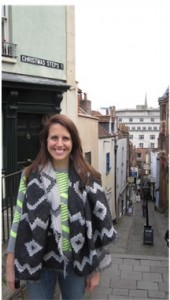By Meghan Chenoweth
I didn’t realize it at the time, but my connection with TARG, where I performed a one-month research exchange in the fall of 2013, started when I was a neophyte Pharmacology PhD student. In 2011, I had co-written a chapter with my supervisor Rachel Tyndale in the book “Genetic Influences on Addiction – An Intermediate Phenotype Approach”, for which Marcus Munafò served as an editor. Fast-forward a year later, and I am sitting in my living room in Toronto on a Saturday afternoon reading an email from Rachel asking if I would want to do a stint of training in the UK with Marcus. Opportunities included: working with data from a large cohort (1000s!) of adolescents, learning new analytical approaches, gaining perspectives on tackling research questions from a novel angle, and living in a new city for a month. My first response was: “When can I start?”
Marcus and I met at SRNT in early 2013 to discuss the opportunity in person, and over the next several months, plans were set in motion. With excitement and anticipation, I arrived in Bristol on a Saturday morning in October 2013 and checked into my accommodations on campus. My initial awe at what would be my home for the next month quickly turned to panic as I realized I forgot to pack a travel adapter. In quick succession, my laptop and cell phone died. I set out into the sunshine, jet-lagged and completely unfamiliar with my new surroundings, determined to find a travel adapter. I happened upon a local shop operated by an electrician and his wife, and after providing me with a travel adapter, they thanked me for bringing the sunshine with me from ‘Canadia’. They then proceeded to draw several maps of Bristol, recommending things to do and sights to see. This was only the beginning of an incredibly long list of kind people I either met or had the pleasure of working with in Bristol.
As I reflect on my time working and socializing with members of TARG, I realize I could probably fill an entire blog. I think it may be more palatable to summarize my more scholastic experiences in four short “lessons” I have learned. These, I think, are applicable to many fields and disciplines, not just research.

Lesson #1: It is important to focus not only on the end result, but also the process used to get there
One of the many great things about working in a talented epidemiology research group like TARG is gaining a true appreciation for the elegance of the analytic approaches used in epidemiologic studies. This is particularly true for longitudinal studies like ALSPAC, where repeated observation at the individual level occurs over many years. I am fortunate to have previously gained some exposure to longitudinal data analysis techniques through working with Jennifer O’Loughlin at the University of Montreal on the NDIT cohort. Fully immersing myself in TARG for a month was an excellent way to not only learn, but also to utilize these approaches in a hands-on manner. I enjoyed writing an ALSPAC research proposal, and having regular meetings with Marcus and Jon Heron. This, together with regular email contact with Rachel, helped guide our ideas and approach to set the collaboration in motion.
I feel that this experience broadened my view of how good research is conducted, in terms of study design and analytic approaches, and I find myself reading papers more critically now. There can be a natural tendency to focus on the outcome and interpretation of the outcome, rather than the process used to generate it. Without a sound process, however, the results are likely meaningless. This lesson was solidified for me by David Nutt during his plenary lecture at the Bristol Neuroscience Festival. In describing how the definition of ‘drug’ changes across disciplines, David Nutt humorously pointed out that pharmacologists define a drug as a substance, that when given to a rat, results in a scientific paper. After I had finished laughing and could hear myself think again, I realized it was a fine teachable moment for me as a budding researcher: never lose sight of the process.

Lesson #2: New perspectives on your own work can arise from sharing ideas with individuals from a variety of disciplines
I learned rather quickly that TARG members are experts in social networking, after Jen Ware sent me my itinerary for the month. We later joked that I would be well hydrated, with daily coffee mornings and weekly pub nights with the School of Experimental Psychology. These were welcoming forums to chat with people from a variety of training levels and areas of expertise within psychology. In a formal conference setting, I have often felt intimidated to approach faculty members, even if I had rehearsed a specific question I wanted to ask (which never comes out quite how you intend). The informal psychology coffee mornings and pub nights, which junior graduate students through to senior faculty members attend, were settings very much conducive to conversation and the sharing of ideas.

Lesson #3: Planning and performing work in a novel environment is refreshing and restorative
Toward the end of my last week with TARG, I was completely surprised to feel so refreshed and ready to continue my projects back home. Working with TARG stimulated new ways of thinking about science and approaches I could use with my existing projects, which gave me a new energy with which to tackle them. I showed up to work early every morning during my first week back in Toronto, which I like to attribute to my newfound zest as opposed to jet lag…
Lesson #4: New collaborations continue long after they begin
This has to be the best part about establishing a new collaboration. I am happy to report that I am continuing to work on an analysis using ALSPAC data. I am too scared to count the number of times I have emailed Jon Heron asking for help, but he is always incredibly responsive. It continues to be a great learning exercise for me and I can honestly say I now view setbacks in a more positive light, as so much more is learned through active trouble-shooting.
I am indebted to Marcus and his group for warmly welcoming me to TARG and I am looking forward to staying in touch with them in the years to come. I think it goes without saying that I would highly recommend an exchange to any trainee that is presented with an opportunity to research abroad, especially with a group like TARG.
Meghan Chenoweth is currently completing her PhD in Pharmacogenetics at University of Toronto.
